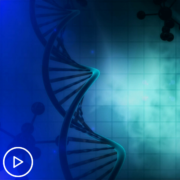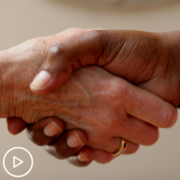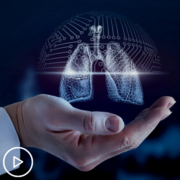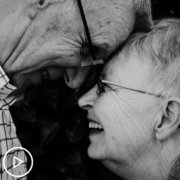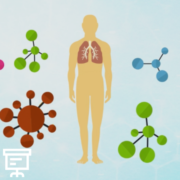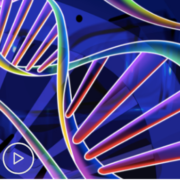Fact or Fiction? Lung Cancer Symptoms, Side Effects & Treatment from Patient Empowerment Network on Vimeo.
When it comes to lung cancer information you find online, how do you decipher fact from fiction? Dr. Martin Edelman, a renowned lung cancer expert and researcher, shares his insight and expertise on symptoms, side effects and treatments for lung cancer.
Dr. Martin J. Edelman is Chair of the Department of Hematology/Oncology and Deputy Director for Clinical Research at Fox Chase Cancer Center. More about this expert here.
View the Fact or Fiction? Lung Cancer program resource guide here
Related Programs:
Transcript:
Patricia:
Welcome to Fact or Fiction: Lung Cancer Symptoms, Side Effects, and Treatment.
Today, we’ll debunk common misconceptions about lung cancer symptoms, side effects, and treatment. I’m Patricia Murphy, your host for today. Joining us is Dr. Martin Edelman. Dr. Edelman, why don’t you introduce yourself.
Dr. Edelman:
So, I’m a medical oncologist. I’m the Chair of the Department of Hematology/Oncology and Deputy Director for Clinical Research at the Fox Chase Cancer Center in Philadelphia, Pennsylvania.
Patricia:
And before we get started, we should say this program is not a substitute for medical advice. Please refer to your healthcare team with any questions.
Let’s start with an overview of lung cancer’s research. Can you tell us a little bit about the field right now?
Dr. Edelman:
So, I think the field has been remarkable over the last few years. There’s been more progress, more drugs, more things that have happened in the last five years than probably the prior 50. It’s been an amazing time both for developments in microbiology as well as in immunotherapy of the disease, which is exciting for all concerned.
For patient’s, of course – really a promise of longer, better lives, even cures where we previously did not see any in advanced disease. For the scientists – an amazing amount of new information. And for clinicians and clinical investigators – just almost too many questions for us to answer.
Patricia:
It sounds like the field is really advancing quickly. What do you attribute that to?
Dr. Edelman:
Well, you know, I think there are a number of things. Everybody always talks about breakthroughs, but breakthroughs really happen after decades of other work. And what’s happening now is really a result of many, many years of different types of work. There were our colleagues in immunology who built this area of cancer immunology for many years – I have to say with much skepticism from many, myself included.
The advances in molecular biology – our abilities to do things with tumors to determine genetics at a rate and a pace and a cost that was previously unimaginable. All of these things have developed in the last few years but really are a result of the decades of work before that. If you look at immunotherapy – probably one of our biggest areas of progress – the roots of that are a century old. So, nothing’s really new. It’s just now we have the technology and the ability to really use it. And then I would also say that we’ve created the infrastructure that lets us test this – the people who have done the studies, the endpoints for the studies, the expertise in doing clinical trials – that also was there for decades, and we frequently were kind of ridiculed at times.
Oh, you’re just testing this drug against that drug, but the reality is is it was those incremental advances. It was the ability to know the endpoints, to refine the populations, to develop the infrastructure that allowed for all of this to happen.
Patricia:
How is genetic testing changing the landscape?
Dr. Edelman:
So, genetic testing – and in this case the testing of the tumor, not the germline, not the individual – has been very, very crucial. If you go back about 20 years ago, there was a family of drugs called epidermal growth factor receptor inhibitors or EGFR inhibitors.
And the basic science at the time made it look like these would be best combined with chemotherapy in squamous cell carcinoma. And as it turned out, combined with chemotherapy they weren’t very useful. But as single agents, there were these occasional very dramatic results.
So, that came at a time when we were able to evaluate tumor DNA, sequence it with some degree of ease at a reasonable cost. So, there was a discovery of specific mutations, which were targeted by these drugs. So, it was sort of interesting in that it was the clinical observation that led to the discoveries in biology, not really the other way around.
But then that in turn resulted in looking for other mutations, which were found, and then the development of other drugs – in some cases, the repurposing of other drugs for those. And now we have about a half a dozen very validated targets, each one of which in a small slice of the population – between say 1 percent and 5 percent – 10 percent of the lung cancer population – but these – if the patient has within their cancer that particular mutation, these are drugs that are 80 percent-plus effective and frequently can be administered with relatively little toxicity.
And usually they’ll give them benefit for one-plus years or more. So, that’s been an example of progress there.
Patricia:
How does lung cancer generally present in people? What might someone notice?
Dr. Edelman:
So, when I teach my residents how do people show up, which is, of course, very different for me – they usually show up with the diagnosis in hand. But for somebody who’s a primary care physician, what are you going to see? Well, you could see symptoms at the site of the origin of the disease – in the lungs. So, the pneumonia that doesn’t go away, the cough that doesn’t go away, the chest pain. So, that’s one way that it can present. It can also present, unfortunately, all too frequently as advanced or metastatic disease where the tumor has spread to other organs in the body, such as bone or brain. So, you may have a pain or a fracture, seizure, headache. Those are all possibilities.
And then sometimes the tumor can secrete various factors. We see this particularly in small cell lung cancer where there are certain metabolic syndromes that can develop or neurologic syndromes as a result of hormones or antibodies that the tumor can secrete. These are called paraneoplastic syndromes.
And then tumors sometimes show up and increasingly so now that screening has been validated, and screening in lung cancer is every good if not superior to screening in breast cancer. There’s a common myth that it doesn’t work. But in fact, this has been now demonstrated in multiple randomized trials done in the United States, in Europe that clearly demonstrate improved outcomes for patients who are at risk who undergo screening exams with low-dose CT.
So, frequently, we see those patients and then again sometimes just incidental discoveries when somebody’s getting a scan for another reason. So, those are all the ways that it can present.
Patricia:
So, it sounds like we’re very good at getting people to doctors like yourself who can specialize in their disease once it’s diagnosed.
How are you approaching treatment decisions with your patients?
Dr. Edelman:
Well, the treatment decisions that we make – that I make are those that are in ways similar to other medical oncologists. It really depends because some of the patients may first go to a surgeon or whatever. However they come into the system, there are a few key factors in this. First is – make your decision based upon, Number 1, which kind of lung cancer. So, there are two major varieties. You have small cell and non-small cell, and they are treated – they are biologically distinct, and they are treated in distinct ways.
And then the next major consideration is the stage of the tumor, which is our way of expressing how advanced that is and deciding on both the therapy as well as conveying a prognosis and evaluating a patient for a clinical trial. And that’s based upon the size and location of the tumor; presence, absence, and location of lymph nodes; and the presence or absence and, these days, the number of metastatic areas of disease.
And then, lastly, and again depending a little bit upon the stage and interacting with all the others is what condition is the patient in? Anybody can get lung cancer, but still the median is in older individuals. Many of these patients have compromised cardiac and pulmonary status as well as other diseases of aging, hypertension, cardiac disease, etcetera. Those people – one obviously has to tailor one’s treatments to fit those comorbidities. So, that’s sort of how the basic assessment – obviously, some patients show up with metastatic disease. We know that, but we go through a whole process for this.
The staging system that we use is complicated, and it keeps changing. We’re, gosh, up to version eight of this? I started with version three. I’m not quite sure I’ve fully mastered the current one, and the ninth edition is coming soon. And why does it keep changing? Because our knowledge of the disease keeps changing. The database keeps expanding.
We’re able to be more refined. Molecular variables have not yet fully entered into our considerations. Unquestionably, they will. But basically, one could consider lung cancer – despite the four major stages and multiple substages – that you really have three buckets that people will fit into. They have localized disease, which we will predominantly address with a localized therapy – surgery, radiation. And many of those patients, however, particularly those who might have a lymph node that’s positive, will benefit from chemotherapy to prevent recurrence.
We have patients with locally advanced disease. Primarily, those are patients who have lymph nodes located in the middle of the chest as opposed to more localized disease where if there’s a lymph node present it’s more in the lobe of the lung. Those patients with lymph nodes in the middle of the chest or larger tumors are approached with frequently a combination of chemotherapy, radiation, sometimes surgery.
And then we have patients with advanced disease who will be predominantly treated with drug therapies, which nowadays, depending upon the molecular background of the tumor, could be a targeted treatment if they have a specific mutation.
Something we see most frequently, though certainly not exclusively, in patients with scant or no smoking history, they may be approached with immunotherapy or chemotherapy combined with immunotherapy.
And there are many considerations that go into those decisions. And even in advanced stage, there are certainly roles for surgery and radiation depending upon whether there are structural abnormalities, occasionally whether there are relatively few areas or several areas of metastatic disease. And in the localized and locally advanced disease, our goal is cure in those, though we certainly are not there for every patient yet.
And in advanced disease, it’s extension of life, which is now quite considerable compared to untreated disease. And I think in certain situations, particularly those who only have a single area of metastatic disease, curative treatment is a realistic possibility. And even those with more disseminated disease, we’re now beginning to see a substantial fraction of patients who are still alive at five years or more. So, we’re beginning very cautiously to think that perhaps some of those patients may even be cured of their disease, though I’m not quite ready to say that.
Patricia:
Well, it sounds, though, like there is a lot of reason to have hope if you are diagnosed with lung cancer, especially if it’s diagnosed early. Of course, that would not stop a patient from worrying.
So, I hope what we can do next is talk a little bit about some of the things we’ve heard patients say, and you can fact-check us on that.
Dr. Edelman:
Sure.
Patricia:
This sounds like a real worrier. There are no new treatments in lung cancer.
Dr. Edelman:
Well, there’s nothing but new treatments in lung cancer. So, I’ve been involved in oncology, I think – let’s see. My fellowship was in the late 80s. That ended about 1990, so we’re about – what is it not quite 30 years later? Virtually every drug that I use was in development during my professional career. Just within the last few years, all the immunotherapeutic agents were developed. Within the last say 48 months, they were licensed. The targeted drugs are all new within the last 15 years or so. So, we’re pretty much nothing but new drugs in lung cancer.
And not just drugs, but also surgical techniques have proceeded from open thoracotomies in almost all patients to video-assisted thoracoscopic surgery, which is less morbid and gets the patient out of the hospital faster.
Radiation progressed from relatively low intensity radiation that was done where you drew it on x-ray. I can still remember that when I was a resident to now four-dimensional assessments and the use of intensity-modulated radiotherapy.
Perhaps a role – maybe, maybe not – for proton therapy in this situation; the use of stereotactic body radiotherapy for treatment of localized disease in patients who are medically unfit – I think we’re nothing but new therapies.
Our supportive care is massively better than it was 30 years ago. Nausea and vomiting, severe problems – it’s largely a thing of the past. We have extremely effective antinausea agents. I may disappoint some people by telling you that marijuana is not one of them. But the fact is is that many of those drugs were developed because the drugs 20 years ago, 30 years ago, were quite nausea producing. And it was heavily lung cancer folks across the country – my colleagues, Dr. Brower, Dr. Gandara, Dr. Einhorn, others – who are very involved in lung cancer, genitourinary malignancies, gynecologic malignancies, but we’re using what’s termed highly emetogenic chemotherapy. We developed many of the antinausea drugs. We were extremely concerned about this.
So, our drugs are better. They’re more active. They’re less toxic. We have better supportive care. We have better integration with other modalities, such as radiation and surgery.
There are still many, many questions with treatment. Many areas we can improve. Many things we don’t know, but it’s nothing but new therapies.
Patricia:
Your history as a physician and noticing all this change will likely help you advise patients who worry that their lung cancer diagnosis is a death sentence, which is something else that we hear from patients.
Dr. Edelman:
So, life is a death sentence. It’s a little bit flippant, but I think that there are many, many bad diseases out there. And certainly, there is no good lung cancer. And I don’t want anybody to leave this and think – oh, everything’s rosy. It’s not. Though I do a lot of administration these days, I’m still in clinic. I see a fair number of patients, and the news is not always good. Not everybody responds. Not everybody benefits. And that’s why we still need to do the trials and advance what we’re doing both in terms of increasing the efficacy and decreasing side effects.
Having said that, we have many, many patients who are living excellent productive lives, able to make life events – anniversaries, birthdays, etcetera – who would not have otherwise been alive to do that. And as I said, there is an increasing fraction of cured patients where the disease is no longer at all an issue. But it’s one of those things – we don’t know until we try. And there is no shortage of bad things that can happen to people. Lung cancer is one of them. I think what we do have is increasing options for people that truly meaningfully improve their lives.
Patricia:
Sure. Here’s one I hadn’t heard until just now. Surgery causes lung cancer to spread.
Dr. Edelman:
Yeah, that’s common in certain states. When I was in Maryland that was a biggie.
So, there’s a myth that the air gets to the tumor, and then it spreads. But that’s certainly not true. It certainly is possible that in a bad surgical procedure that disease can be spread, but I think historically what that was was in the days before we had as accurate of radiographic studies. So, it’s kinda interesting. I always say, “I’m not that old, and I began medical school before there were CT scans.” So, the way you would diagnose something was with a chest x-ray. That was your best chest imaging. And the brain you’d image with something called a pneumoencephalogram, which is – you don’t know what that is. Most people don’t, and they should be thankful for that. But we had no real way of knowing these things. So, what would happen is there would be a surgical exploration. They would say, “Well, it looks very localized.” But then you’d go in, and there was lots of disease all over the place.
And for the most part, that doesn’t happen anymore. Now we have CT/PET scans. We have MRIs. Patients before they go to surgery usually have had – our pulmonary physicians will usually have sampled the nodes in the middle of the chest, the mediastinum. So, it isn’t that there aren’t surprises, but there are far fewer. And certainly, a properly done operation should not spread lung cancer. I would emphasize the properly done operation. It is my strong belief that nobody should have surgery for lung cancer from other than a board certified thoracic surgeon who spends their time thinking about lung cancer, preferably in an institution with a fair volume of this.
We know – it should be no surprise to people, practice makes perfect. People who really focus in an area – people at the NCI-Designated Cancer Centers, comprehensive cancer centers – who do a lot of this have greater expertise.
Patricia:
How about this one? Treatment is not effective in older patients.
Dr. Edelman:
Treatment is highly effective in older patients. It’s interesting. So, we had long arguments about, when I started in this field, whether treatment ever worked, and there were a number of studies that showed that chemotherapy – that one platinum was better – what’s called a platinum-based agent – was better than no therapy.
And then that two drugs were better than one drug. And people would say, “Oh, well, that doesn’t work in the elderly. And they should only get one drug.” And that’s because, I guess, their burning bush on the lawn told them this. And the fact is is that then got evaluated in a controlled trial, a very nicely done study by my European colleagues. But what was crucial was that they used somewhat lower doses of chemotherapy, a little bit different schedule of chemotherapy, and it was clearly superior to a single agent. And those were even days before immunotherapeutics and these targeted agents. So, many patients will benefit. You just have to be aware of certain basic principles in geriatric medicine as well as basic principles of lung cancer care.
So, first off, if the patient is elderly but their tumor is characterized by a driver mutation, they get one of the so-called targeted agents. And these are these days very non-toxic, easy to take, and highly effective.
Patients – many are going to be eligible for immunotherapy either as a single agent or combined with chemotherapy. Chemotherapy drugs could certainly be cut in their doses and still preserve much activity and be done safely.
I had a woman with small cell lung cancer. This is now about a year and a half ago or so. And she’s in her 80s. And she came to me because she was told – oh, just sorta get your affairs in order. And her disease was what we term an extensive small cell. The staging system’s a little bit different, but she didn’t have a really vast bulk of disease. And we treated her with standard chemotherapy drugs but at somewhat lower doses and some careful TLC and some other supportive things like growth factors.
She got all of her treatment on an outpatient basis, had an excellent response. We used radiation later to consolidate her treatment, and I see her back every couple of months. I wouldn’t say that she’s necessarily cured of her disease, but she does yoga every day. She lives a full life. She sees her grandchildren. And she’s, I think – I wanna say 83-84 years old. I think she’s quite grateful for that. It’s not the numerical age.
The flipside is if somebody’s 50 years old and they’re extremely ill when they come in, then one has to be very cautious about what one does. We used to say that those patients who come in who are severely impaired should simply get supportive care and hospice services.
And actually, how would I put it? Our lives have gotten a little bit more difficult lately because as things have gotten better for patients – because I can’t necessarily say that as much because some patients may be very susceptible to the effects of – their disease may be very susceptible to the effects of immunotherapy. I had one patient who was a younger gentleman who was on a gurney. He was in his 50s, lost an enormous amount of weight , he was on oxygen. We immediately gave him fluids. My fellow – I had an excellent fellow at the time – came to me and said, “Should we admit him and send him to hospice? Or just send him to hospice?” And I looked, and he had a biomarker that indicated that he might have an excellent response to immunotherapy, so we gave him solely immunotherapy and saw him back a few days later. He was still pretty touch and go. We gave him some fluids. A week after that – still, we were kinda touch and go, but he was still with us.
And then a week after that my medical assistant, comes in, and she says, “You know, he looks a little bit better today.” And he was in a wheelchair that day. And then a few weeks after that, he had a walker, and a few weeks after that a cane and about a year after that was asking me about whether or not he could go on a cruise. Again, I still see this gentleman – a couple weeks ago. It’s now almost two years later. And the question now that we have is – should we stop his treatment? And he is restored to complete full health, has had almost no side effects of treatment.
So again, this is not every patient. Some people will be treated and get every side effect and no benefit, but I think I’ve become a lot more reluctant to say that any patient should not at least be offered the opportunity for treatment knowing what the potential side effects are. And there still are considerable and sometimes severe side effects from therapy.
Patricia:
Yeah. And again, your experience and your long perspective on this disease can help you advise your patients thoughtfully. Here’s the last one that I have on my list here. Clinical trials are experimental and risky.
Dr. Edelman:
Yeah. Well, so is the rest of life. So, there generally – is there risk? Yes. Essentially, every patient is always a trial because we for the most part don’t – even in the disease states where we have very active treatment – so, let’s say – for example, we were talking about the EGFR mutation. So, we have excellent drugs. We have a drug now, osimertinib – outstanding drug, easy to take, low risk of side effects.
The earlier generations – there was a lot of rash, diarrhea. That’s been pretty much done away with. But on average, patients benefit from this drug for about a year and a half.
So, that’s not great if you’re 40 or 50 years old. You want to do better. So, what are our current studies? Well, we’re looking – we’re re-addressing a question that we thought had been answered, but really it wasn’t – about, well, what’s the value of chemotherapy plus this drug? What about the value of other drugs?
So, we can’t promise anybody anything, but our current treatments are still not good enough. There are certain diseases, let’s say Hodgkin’s disease, where you know you’re gonna cure almost all the patients up front or testicular cancer, etcetera, where – again, but thanks to trials, clinical trials, we now are at that stage. We’re not there yet in lung cancer, and the reality is is every patient should really be on a study. I think it’s – and we have this problem now in that our studies have also become far more complicated to enter people in because there are many more variables one has to look at it. What’s the molecular background of the tumor? How many prior therapies?
The condition of the patient, their organ function, etcetera – and the regulatory burden has become much, much greater. But clinical patients are in clinical trials. Let’s look at the question. Are they risky? Well, everything is risky, but we do a lot to manage that risk. Patients who are in studies are observed more closely. We have to. It’s the law. There’s frequently additional personnel assigned. They’re usually getting standard of care plus a new treatment or a new treatment followed by the standard of care or some variation of that.
They’re observed, like I said, much more carefully than we would otherwise. And so, I think actually patients on trials generally will do better, and we actually have evidence. Multiple individuals have looked at this – everything from first-in-man trials or early dose escalation studies, controlled studies – that show that patients, even those on the control arm, generally do better than similar types of patients who are not treated on studies because we just are more careful.
And the physician who participates in trials is generally someone who has a greater knowledge of the disease.
Patricia:
Sure. What do you notice from your patients? What do they tell you that you think needs to be debunked?
Dr. Edelman:
Well, very similar to some of the questions that you’ve asked. I mean we address these issues all the time about – is there hope with this? How bad is it gonna be, etcetera? Sometimes people think that inevitable diagnosis is gonna have pain and misery, etcetera, or a lot of admissions. I spend a lot of time particularly in their first visit addressing many of the questions that they may have.
And again, there’s always this problematic balance with the disease, particularly in the advanced setting in particular, where one has to balance out what is, I think, an increasingly positive picture with the reality that still the vast majority of patients will ultimately die of their disease, but the question is – how long can we put that off? How can we improve quality and quantity of life, even if one is going to ultimately die of the disease?
I think those are the things – there’s this weird dichotomy that people come to believe in that either you get treated and you’re gonna always have symptoms or your life will be pleasant and wonderful, and you’ll have this quiet wonderful peaceful demise if you’re not treated. And it’s really not true. The disease can be extremely uncomfortable, painful, distressing, etcetera. And treatment puts that off. Treatment prevents symptoms. Treatment improves quality of life.
And it takes a little bit of time because that’s how people are very socialized with this. Not every drug causes hair loss. Not every drug results in nausea. There’s too much misinformation out there.
Patricia:
Sure. Sure. Treatment can arrest the disease or slow down the progression of the disease, but it also has side effects.
Let’s talk a little bit about some of the concerns that patients have about the side effects. Let’s see: Side effects are unavoidable.
Dr. Edelman:
Well, that’s not true. As I said, what were the side effects? If you go back a couple decades and you ask patients what were they concerned about, many of them were concerned about nausea and vomiting. And that is largely a thing of the past. Many patients will still have some queasiness with treatment, but even our most nausea-producing drugs – we really do have outstanding drugs for the prevention of that. You have to use them. You have to take them.
It’s very important to give them appropriately. There are very excellent guidelines that are out there. Sometimes, patients are still undertreated, no question about that. Not every drug has industry strong backing. There’s one drug – for example, olanzapine, (Zyprexa) was actually developed as an antipsychotic, and I always tell the patients, “No, I don’t think you’re crazy.”
But it’s at a lower dose, and we have excellent, excellent evidence that that drug given for a few evenings after chemotherapy is extraordinarily effective along with the other drugs in preventing nausea and vomiting. So, that’s one thing.
Hair loss is still somewhat inevitable with certain drugs – the taxanes. But many of our regimens don’t cause hair loss.
Or as I tell folks – only you and your hairdresser will know for sure because its hair on the pillow, but the average person won’t pick you out of a crowd. Those are big concerns still. There still are potentially life-threatening effects from chemotherapy, and we spend a lot of time educating people about that. But those are not inevitable, and it’s actually a minority of patients in lung cancer.
One should not confuse – there are different malignancies. Still, the treatments for say leukemia, though even that’s changing, can be extraordinarily toxic or the bone marrow transplant patients. Many, not just lung cancer, but in the other diseases as well – many of the things that people attribute to the drugs are more due to the disease. So, I always say, “The greatest failure and side effects to the drugs are they don’t work well enough because the side effects of the disease can be considerable.” So, that’s the bigger issue. The immunotherapeutic drugs have a rather interesting set of side effects.
They are clearly initially or frequently better tolerated than the older cytotoxics, which still have an extremely valuable place in the treatment and cure of lung cancer. The immunotherapeutics have clearly been quite beneficial, but their side effects can be subtle and far less predictable and can be very severe. Virtually, any organ in the body can be affected by this. We like to say, “If it ends in ‘itis,’ you can get it from immunotherapeutics.”
So, there are lots of side effects, no question. But they can be managed. They can be prevented. They can be treated. Sometimes, we have to abandon a drug. So, people who get severe – what we call immunotherapy-related adverse events – may not be able to continue on their drugs. But even that is not necessarily always the case.
Patricia:
This next one really gets to the heart of the doctor-patient relationship.
I shouldn’t share my side effects with my healthcare team because I don’t want them to stop my treatment routine.
Dr. Edelman:
Well, you can’t prevent the side effects if you don’t know about them. And I always would tell patients, I said, “You know, if you’re having a problem, please don’t call me at 4:00 on Friday afternoon. I’m gonna end up sending you to the emergency room, which I may anyway.” But a lot of times, we can solve certain things over the phone. There are a lot of side effects that can be treated and particularly if one is aware early on. So, yeah, you should share the side effects because how’s somebody gonna know how to deal with them?
Now, the problem we run into sometimes is in a population that’s on average 60s and 70s, could be younger. There’re lots of things that can be just part of ordinary life. Everybody gets headaches, back pain, etcetera, etcetera.
We have to treat those sometimes and evaluate them much more aggressively because of the possibility of them being related to disease or drug, but it helps to sort it out. You can’t be too blasé about it because sometimes things need to be looked at very urgently, particularly with immunotherapeutic drugs. Some of the side effects that can be severe can sometimes be very subtle in their onset.
Patricia:
What else to patients talk to you about? What kinds of things do they come in and talk about that may need to be debunked or that you need to correct?
Dr. Edelman:
Well, it’s not contagious. It’s not hereditary, things like that. Many people – I’ll ask always about asbestos. And they’ll say, “Well, I worked in this old building that had asbestos in it.” Well, that doesn’t count, particularly one of the rarer – we’re not really talking about it today, but mesothelioma, which is associated with asbestos.
You know you gotta actually really be exposed, which means that somebody has to have torn into that. The latency is 30-40 years, so it’s the pipefitters; but actually, the most common cancer associated with asbestos is non-small cell lung cancer. It’s not mesothelioma. There are lots of those sorts of things. But in general, many of the questions you’ve raised are quite common questions.
Patricia:
As a patient, how can I differentiate between symptoms of lung cancer versus the effect of treatment? What should I be thinking about as a patient?
Dr. Edelman:
It’s not always easy. And again, that’s why you gotta discuss it, and it’s not always easy for me to determine that because there are always several possibilities. It could be a side effect of treatment, it could be a side effect of disease, or it could be a side effect of people’s comorbidities. And these frequently interact. So, a patient – anemia is a common problem where you have low red blood cells.
Well, we know that you get anemia from disease. That causes a degree of what’s called anemia of chronic disease.
Our drugs frequently can result in anemia, and then anemia can bring out other symptoms. Patients who have lung and heart dysfunction to start with are gonna have more problems. They may get angina. So, there’re a lot of these things that interplay. And it’s not always straightforward.
Patricia:
And Dr. Google can really get involved here.
Dr. Edelman:
Yeah. That’s always a problem, yeah.
Patricia:
Yeah. Which brings us to our next section – myths about lung cancer in general. How about this one? All lung cancer is the same.
Dr. Edelman:
Well, I think by now one should be clear that not only is it not the same but even what we used to term – as I said, my life as a clinical investigator used to be a lot easier because we had non-small cell lung cancer. We had a particular stage.
And now we have EGFR mutated. We have non-small cell lung cancer that occurs in people without a driver mutation. And then, well, do they have something called PD-L1 expression? Which if it’s high, predicts for benefit from immunotherapy alone; and if not, then chemotherapy and immunotherapy is kind of the way to go in patients who are reasonable for that. We have patients who may have an EGFR mutation and then, which kind of EGFR mutation? Patients without mutations, ROS, RET, cMet. It goes on and on and on and on.
And all of these are different in small-cell lung cancer and then stage of disease. And even within the stages, there are all sorts of subtleties in terms of the optimal treatment. So, it really is a team decision for many of these patients how to treat them. And like I said, there are an increasing number of options.
And the answers are not always clear or perfect.
Patricia:
Right. How about this one? Lung cancer only affects the lungs.
Dr. Edelman:
Well, obviously, lung cancer can spread and kinda goes wherever it wants. There is essentially no organ in the body – I’ve had patients who were referred to me as “lung cancer” – rather who initially showed up with a breast mass and were seen by breast cancer physicians. They would biopsy it, and it was clearly lung cancer that had metastasized to the breast. Lung cancer can go to the eye then go to the brain, the skin, the adrenal glands, the liver. It’s a disease that unfortunately likes to travel and metastasize in the body very early in its natural history. In other words, when you say early in late lung cancer that’s not necessarily a time. It’s really low stage and high stage. You can see a lung cancer that can be a rather small tumor in the lung that may have already spread elsewhere in the body.
Patricia:
Right. Right. How about this one? Supplements will help with symptoms and side effects.
Dr. Edelman:
Not likely, and more likely the other way around. So, as I said, we have some very good ways of preventing things like nausea and vomiting. There’s a lot of advice that is quite reasonable in terms of dealing with side effects – staying well hydrated. Hydration means salt-containing fluids – chicken soup, of course, being just about perfect or Pedialyte. Things like that are very good. But exercise is extremely good.
The problem with supplements is nobody really knows what’s in those. Many things can interact with various drugs. The term nutraceutical to me is nonsense. They’re unregulated drugs. And what do I mean by that? Many substances and many foods metabolize through the liver or influence enzymes in the liver. Many of our drugs are processed through the liver.
Drugs can influence – so, a drug that might inhibit the metabolism of a chemotherapy or a targeted drug will increase the body’s exposure to that. That can increase the side effects. Or alternatively, it can accelerate the processing of the drug, which will decrease the efficacy. I’ve seen this on many occasions.
One should think that much of the population is on anticholesterol drugs, cholesterol-lowering drugs called statins. Well, if you – I’m sure anyone who does it – you look at the bottle or you got the advice from the physician that says, “Don’t have it with grapefruit juice.” So, let’s think about that. If grapefruit juice can substantially increase the side effects from a very commonly utilized drug like a statin, just think about what an unknown thing that you bought – and remember, everything you buy at these stores – that so-called supplement – you have no idea what’s in it. There’re no standards for these.
The FDA is not really checking on those. I believe a few years ago the New York State Attorney General looked at this and found out a lot of these supplements were sawdust or weren’t what they say they were. So, I’m very – I would strongly discourage the use of anything outside of what’s actually a prescribed medication. If one wants to use an alternative therapy, like yoga, massage, image therapy, and again exercise, things that we know really work with people – absolutely, do that. But I would discourage these herbal medication supplements, etcetera. Or if you insist upon it, definitely tell your physician because then when they’re dealing with the side effects, it helps them to figure out what it was.
Patricia:
Yeah. Discussing what you’re taking or what you would hope to take with your physician and your care team is probably paramount.
Let’s talk a little bit about health literacy. What would you suggest patients use for online resources? What are good resources?
Dr. Edelman:
So, there are some excellent resources. The International Association for the Study of Lung Cancer has resources for patients. The National Coalition of Comprehensive Cancer Center Network (NCCN) has resources. American Society of Clinical Oncology has resources. So, those or American Cancer Society. So, there are some really reliable sources out there. And there’s a great deal that’s very unreliable – people’s Facebook pages. I’ve seen this.
Patricia:
It’s a big place.
Dr. Edelman:
Everybody always – and I think it’s important for people to understand. There will be people who will get something and have a fantastic response. I’ve used anecdotes.
The anecdotes I’ve used are to illustrate the potential hope of benefit. They’re not exceptions to the rule anymore. They’re the good case scenarios. I could have just as many anecdotes of people who didn’t benefit and stuff. And I think it is important going into this – and that’s why we are reassessing patients constantly and getting repeat scans because we don’t necessarily know always – even if something’s 90 percent effective, it means 10 percent of the time it’s not.
And each patient – we’re getting better at individualizing and personalizing therapy, but we’re not perfect yet. And we probably never will be. So, there will always be anecdotes. I think what’s – as a friend of mine puts it – the plural of anecdotes is not data. When I say, “Well, chemoimmunotherapy works.” It’s not because I have anecdotes of that, though anecdotes illustrate the magnitude of benefit.
I have data that shows that the chemoimmunotherapy regimen was compared to chemotherapy and was clearly and unequivocally superior. When I give a statistic that 60 percent of patients, 65 percent, can benefit from those types of regimens. That’s based upon prospective randomized control trials.
Patricia:
Dr. Edelman, as a researcher in the field, tell us why you’re hopeful about lung cancer research.
Dr. Edelman:
Well, I think that we have gone from trials with very small incremental improvements and frequently a very slow degree of progress where if we had a positive study every two or three years, we were thrilled – to the point where we’ve had an avalanche of positive studies. I don’t think my younger colleagues know what a negative trial looks like anymore. Even our negative trials are pretty impressive. We’ve had studies where an immunotherapy agent was compared with chemotherapy. And it was designed to show that the drug would be better.
And it was just as good, and that was a negative study. That’s the correct interpretation, but still I would point out that that’s quite remarkable because these other drugs had taken us 25-30 years to develop. And now we have another drug with a very different mechanism of action that’s as good potentially. That’s impressive. I think we’ve just had an amazing degree of progress in the last few years. We have far more drugs. We understand far more about the disease – the technology at every point from diagnosis to assessment of response to the ability to evaluate better what we’re not doing well. So, our studies now frequently have biopsies before, during, and after treatment in a way of trying to figure out why is stuff working or not working.
Back in 2006 or so, I proposed a study. We ended up doing it, but it took two or three years because we were requiring a biopsy result – actually, not even a new biopsy but just an archived specimen from the original biopsy to determine eligibility, and there was strong pushback that we would never be able to do that. And now, we routinely are getting biopsies and re-biopsying, and that’s over a brief period of time.
So, we’re getting to get better understanding of the disease, and why stuff works and doesn’t work. And I think that that’s why our progress will accelerate. And I would again emphasize progress only happens – real progress – only through clinical trials. We’ve cured a lot of mice for many decades. A mouse is not a person. You actually have to do the studies patient by patient, and I think we are making substantial progress. We almost have too many things to test right now.
Patricia:
That’s a good problem to have. Dr. Edelman, thanks so much for taking the time today.
Dr. Edelman:
You’re welcome. My pleasure.
Patricia:
And thank you to all of our partners. To learn more about lung cancer and to access tools to help you become a proactive patient, visit powerfulpatients.org. That’s powerful patients with an S .org. I’m Patricia Murphy, your host. Thanks.
